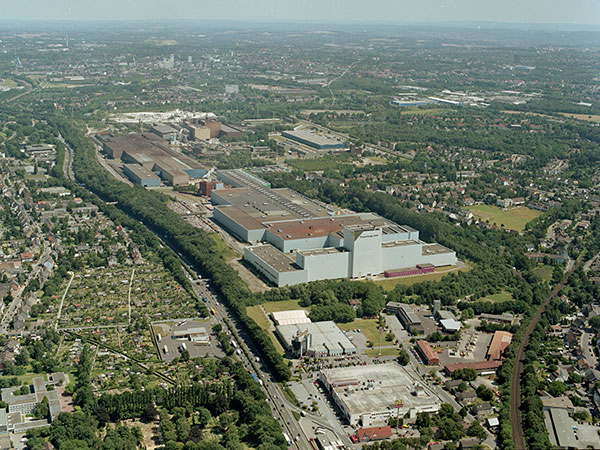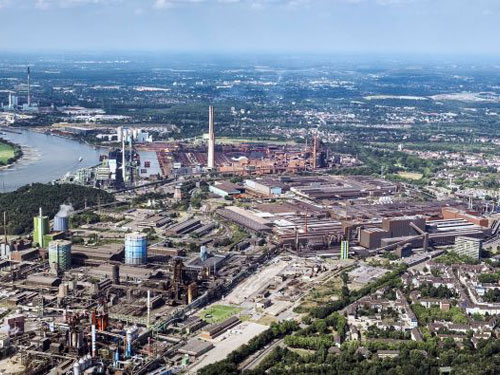thyssenkrupp continues to implement Steel Strategy 20-30
Feb 12, 2021Construction of new core units at the Duisburg and Bochum sites aims at expanding premium steel range and strengthening competitive-ness
thyssenkrupp invests in the future viability of the steel business. Following approval of the investment funds, the first contracts are about to be awarded. The plan is to convert the casting rolling line in Duisburg into a new continuous casting line with a downstream hot strip mill the main components of which are new. Moreover, the existing continuous casting line 3, also in Duisburg, will be rebuilt to optimize the slab production. Investments are also planned at the Bochum site: The plan is to build a new double reversing mill and an annealing and isolating line. Both will strengthen the Bochum site’s position as a competence center for steels for e-mobility. The projects involve an overall investment volume in the high three-digit million range. Completion of all projects is scheduled for the end of 2024. With this investment package for the steel business, the biggest since the construction of the Schwelgern coking plant in 2003, thyssenkrupp makes a clear statement: The steel business is sharpening its focus on technology and quality leadership and intends to further strengthen its strong position in European competition. To reach these goals and to realize the full earnings effects of the investments, further significant cost cuts will be necessary. thyssenkrupp Steel sees no alternative here, as the financial consequences of the corona crisis are expected to have an impact for many years to come.

Investments and costs cuts are two sides of the same coin
The basis for these investments is the collective agreement “Zukunftspaket Stahl“ concluded with the works council in the spring of 2020. This agreement provided, among other things, for the implementation of the investments as part of the Strategy 20-30 and a reduction of 3,000 jobs. “thyssenkrupp AG has now approved the funds for important investments in our production network“, explains Bernhard Osburg, Chairman of the Executive Board of thyssenkrupp Steel Europe. “This is a strong signal for the steel business and a strong mark
of confidence in difficult times. The projected investments enable us to develop our position in important future markets, thus making our business fit for the future. The Strategy 20-30 is the right approach for this. But investing is not enough: the pandemic has once again dramatically exacerbated our financial situation. We have to join forces with our employees and the works council to close the financial gap caused by the corona crisis in the years to come and to limit the repercussions of the pandemic. We will stick to our goal to achieve the profitability originally targeted in the Strategy 20-30. All parties involved must be aware of the fact that we will also have to consider further job and cost reductions, if we do not want to put at risk what has been achieved and agreed so far“.

Thinner, stronger, wider: Investments in quality and future markets
thyssenKrupp’s goal behind the Steel Strategy 20-30 is to produce an even higher-value product portfolio, while optimizing the cost structure. The growing requirements of automotive customers and individual industrial sectors play a particularly important role in this context. These include crash-relevant sheet steel for safety architecture of vehicles, improved surfaces, or thinner and higher-performance steels for e-mobility.
The company plans a targeted revamp and flexibilization of its production network to secure its position as a leading supplier in terms of quality and performance in the European market. One focus of the projects is on slab and hot strip production. This includes – aside from the reconstruction of the continuous casting line 3 – above all the division of the casting rolling line at the Duisburg site. Within the value creation network, this plant has a key position in supplying the downstream units. In the long run, however, the qualitative capabilities of the casting rolling line commissioned more than 20 years ago will no longer be sufficient to meet future customer requirements. Therefore, the unit is now divided into a continuous casting line and a downstream hot strip mill, which will also supply the downstream processing units at the Bochum site. Investments will also be made at the Bochum site: Two new units, namely a new double reversing mill in the cold rolling mill and a new annealing and isolating line, are of major importance to serve the fast-growing e-mobility market. For this application, thinner and stronger sheets are needed to increase the performance of electric motors. thyssenkrupp is already the leading supplier in this European market and intends to strengthen its position through the planned investments.

Bernhard Osburg: “The planned investments will further improve our technological capabilities and the flexibility and reliability of our production network. They will enable us to ensure our competitiveness through the quality of our products also in future. This is a strong signal for our customers, whom we will incidentally continue to supply with the usual products during the conversion and new construction work. The next step is to implement the projects. One goal unites us: We want to be a strong, competitive and viable steel company in the Rhine and Ruhr region”.
Similar Stories

December 2024 U.S. Transportation Sector Unemployment (4.3%) Was the Same As the December 2023 Level (4.3%) And Above the Pre-Pandemic December 2019 Level (2.8%)
View ArticleDP World appoints Jason Haith as Vice President of Freight Forwarding for U.S. and Mexico
DP World, a global leader in logistics and supply chain solutions, has announced the appointment of Jason Haith as Vice President, Commercial Freight Forwarding – U.S. and Mexico, effective immediately.…
View Article
Amaero secures final approval for $23.5M loan from Export-Import Bank
View ArticleU.S. Bureau of Labor Statistics employment situation
Total nonfarm payroll employment increased by 256,000 in December, and the unemployment rate changed little at 4.1 percent, the U.S. Bureau of Labor Statistics reported today. Employment trended up in…
View ArticleImport Cargo to remain elevated in January
A potential strike at East Coast and Gulf Coast ports has been avoided with the announcement of a tentative labor agreement, but the nation’s major container ports have already seen…
View ArticleS&P Global: 2025 U.S. transportation infrastructure sector should see generally steady demand and growth
S&P Global Ratings today said it expects activity in the U.S. transportation sector will continue to normalize in 2025, with growth rates for most modes of transportation slowing to levels…
View ArticleGet the most up-to-date trending news!
SubscribeIndustry updates and weekly newsletter direct to your inbox!





